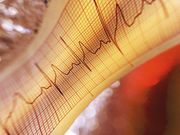Patients with paroxysmal atrial fibrillation have highest levels of transforming growth factor-β1
WEDNESDAY, Feb. 1, 2017 (HealthDay News) — For patients with atrial fibrillation (AF), transforming growth factor-β1 (TGF-β1) is associated with recurrence after catheter ablation, according to a study published online Jan. 27 in the Journal of Cardiovascular Electrophysiology.
Hideyuki Kishima, M.D., from Hyogo College of Medicine in Nishinomiya, Japan, and colleagues examined the correlation between TGF-β1 level and clinical factors before catheter ablation in a prospective study involving 151 patients (59 with persistent AF, 54 with paroxysmal AF [PAF], and 38 controls). Patients who underwent catheter ablation were followed for 12 months.
The researchers found that the PAF group had the highest TGF-β1 levels. Fifty-three percent of patients had early recurrence of AF (defined as episodes of atrial tachyarrhythmia within a three-month blanking period). Thirty-two percent of patients had recurrent AF after the blanking period. Only low TGF-β1 level was an independent factor associated with recurrent AF on multivariate analysis. The low TGF-β1 group (<12.56 ng/mL) had a higher AF recurrence ratio than the high TGF-β1 group (55 versus 24 percent; P = 0.002).
“Paroxysmal AF was associated with a higher TGF-β1 level,” the authors write. “Moreover, lower TGF-β1 level in AF patients could be a cause of recurrent AF after catheter ablation.”
Full Text (subscription or payment may be required)
Copyright © 2017 HealthDay. All rights reserved.








